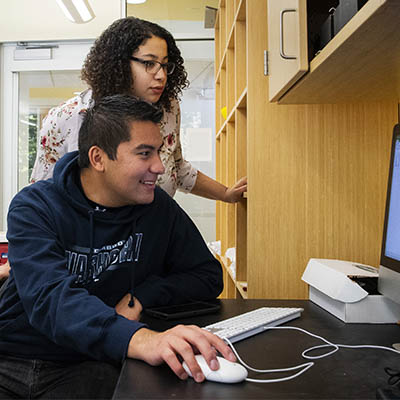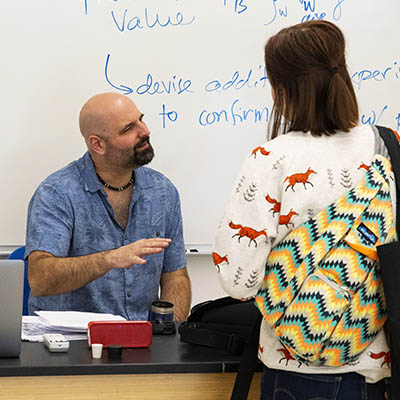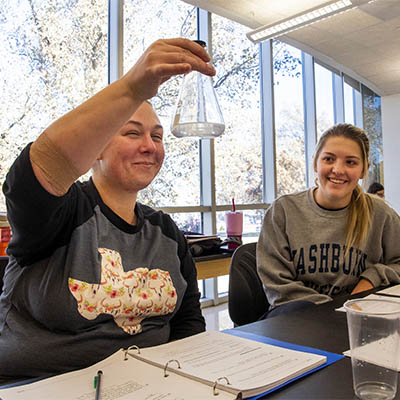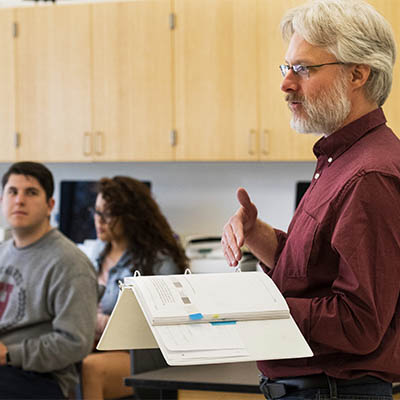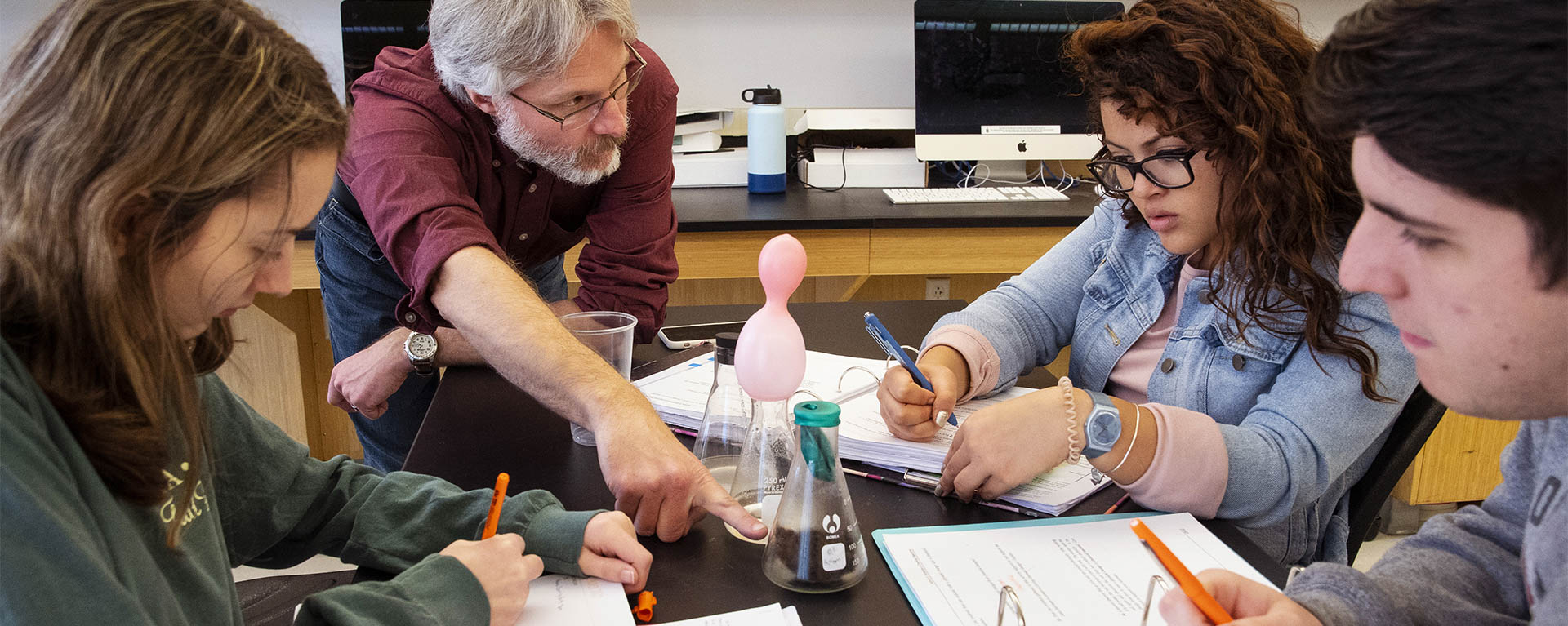
Why study Physics at Washburn?
Whether you want a career as a researcher, an attorney, or an educator, the Physics program at Washburn will provide the foundation you need for success. Our small classes, all taught by expert faculty rather than graduate students, give you lots of opportunities to build connections with faculty mentors and your peers. You’ll graduate as a scientist prepared for the rapidly changing world.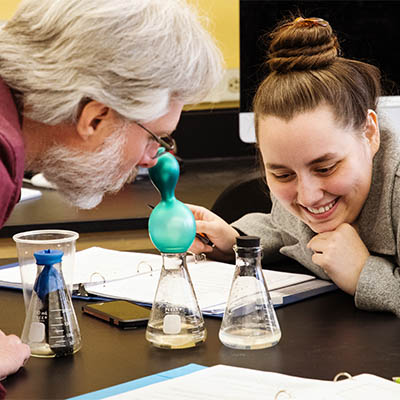
What sets Physics at Washburn apart?
- The Physics Department offers lots of supports to help you reach your goals, including free tutoring, varied research opportunities, and several internship sites.
- Physics Department Scholarships are available to incoming and returning majors.
- Find your people on campus with Physics and Engineering Club.
- Graduate with research experience guided by a faculty mentor, which could lead to a conference presentation and/or publication. Our faculty work in the areas of astrobiophysics, biophotonics, and numerical relativity.
- Get an internship! Physics faculty and prior students have built strong relationships with local and regional companies and agencies who are looking for interns.
Admissions scholarships
Washburn University offers generous scholarships based on your interests, career aspirations, community service and academic success.Physics department scholarships
The physics department offers renewable scholarships for new and returning physics majors. Applications are due early in the spring each year.- Admissions scholarshipsAdmissions scholarships
- Physics department scholarshipsPhysics department scholarships
Tuition and fees
Courses in this program are offered at the Traditional Undergraduate Rate.Financial aid
Washburn University offers generous undergraduate financial aid, including scholarships and grants.Tuition waivers
If you don’t currently live in Kansas, learn about our Tuition Waiver programs that may qualify you for in-state tuition.- Tuition and feesTuition and fees
- Financial aidFinancial aid
- Tuition waiversTuition waivers
Bachelor of Science
All B.S. majors complete a guided research project for at least one semester.
Bachelor of Arts
Mentored research is option in this path. Language courses are required.
PS 101 Physics in Everyday Life (5)
An integrated lecture and laboratory course designed for people pursuing degrees outside the natural or health sciences and who are interested in understanding how physics forms the backdrop of modern life. Topics include motion, gravity, energy, heat, sound, light, electricity, and magnetism, discussed in terms of impact on modern society and everyday life. Laboratory exercises demonstrate physical concepts while emphasizing the scientific process of data collection and analysis. This course requires no previous science or mathematics background and cannot count towards Physics Department degree programs. Fulfills the general education requirement of a natural science course with lab. Course consists of three hours of lecture and three hours of laboratory exercises per week. Prerequisites: None.
PS 102 Physics of the Human Body (5)
An integrated lecture and laboratory course designed for students pursuing degrees outside the natural sciences and who are interested in understanding how physics relates to the human body. Topics in classical physics, such as motion, gravity, pressure, energy, heat, sound, light, electricity, and magnetism, are discussed in relation to the human body and everyday life. Laboratory exercises demonstrate physical concepts while emphasizing the scientific process of data analysis. This course requires no previous science or mathematics background and cannot count towards Physics Department degree programs. Fulfills the general education requirements of either Natural Sciences or Scientific Reasoning and Literacy. Course consists of three hours of lecture and three hours of laboratory exercises per week. Prerequisites: None.
PS 103 Physics and Engineering Seminar I (1)
An overview of the fields and practice of physics and engineering. Students will participate in weekly readings and discussions, and complete at least one written piece and at least on presentation. Specific content will change each time the course is offered.
PS 120 Meteorology (3)
The Earth’s atmosphere and basic circulation patterns including types and classification of clouds and air masses, the formation of fronts, winds aloft computations, principles of forecasting, energy considerations and other associated physical processes. This is a general education course. Prerequisites: MA 104 or one and a half years of high school algebra.
PS 126 Physical Science for Elementary Ed (5)
This course, designed to provide a comprehensive background in physical and earth science for the elementary school teacher, will provide lecture and laboratory experiences which will serve to improve confidence in both scientific process and product applicable to all elementary curricula. Four lectures and one lab period per week. This is a general education course.
PS 131 Biological Physics for the Health and Life Sciences (3)
A one-semester course covering classical and modern physics, designed primarily for students in the health professions. Typical subjects include the laws of motion, gravity, heat, sound, light, electricity, and magnetism. Subjects are treated conceptually along with the use of basic data. Recommended for partial fulfillment of the graduation requirement in natural science. Not applicable toward credit for physics major requirements. Students will not receive credit for both PS 101 and PS 131. This is a general education course. Prerequisites: MA 112 or MA 116 or higher, or concurrent enrollment.
PS 132 Biological Physics for the Health and Life Sciences Laboratory (1)
A laboratory exploring classical and modern physics, designed primarily for students in the health professions. Experiments in motion, gravity, heat, sound, light, electricity, and magnetism are designed to teach physics concepts and basic laboratory techniques. The course is designed to introduce students to laboratory techniques used in physics, emphasizing instrumentation, data acquisition, and analysis. One three-hour laboratory period per week. Recommended for partial fulfillment of the graduation requirement in natural science. Not applicable toward credit for physics major requirements. This is a general education course. Prerequisites: PS 131 or concurrent enrollment. Concurrently enrolled students may not drop PS 131 and remain enrolled in PS 132.
PS 170 Special Topics in Physics (1-3)
Selected topics in physics, announced in advance. Prerequisites: Determined by instructor.
PS 261 College Physics I (5)
Recommended for medical arts and general science students. Mechanics, heat, and sound are studied. Lecture-recitation and laboratory. This is a general education course. Prerequisites: MA 116 and MA 117, or MA 123, or MA 151, or concurrent enrollment.
PS 262 College Physics II (5)
A continuation of College Physics I. Electricity, optics and modern physics. Lecture-recitation and laboratory. Prerequisite: PS 261.
PS 281 General Physics I (5)
Required for students who wish to major in physics and astronomy and for pre-engineering students. Mechanics, heat, and sound are studied. Lecture-recitation and laboratory. This is a general education course. Prerequisite: MA 151 or concurrent enrollment.
PS 282 General Physics II (5)
A continuation of General Physics I. Electricity and magnetism, optics, and modern physics. Lecture-recitation and laboratory. Prerequisite: PS 281.
PS 303 Physics and Engineering Seminar II (1)
An overview of the fields and practice of physics and engineering. Students will participate in weekly readings and discussions, and complete at least one written piece and at least one presentation. Specific content will change each time the course is offered. Prerequisite: upper-division standing.
PS 310 Relativity (2)
Concepts of space and time, frames of reference, Einstein’s Theory of Special Relativity and elements of General Relativity. Prerequisite: PS 262 or PS 282; MA 253.
PS 320 Electromagnetic Theory I (3)
The basic theory of electromagnetic fields and waves using calculus and vector methods. Prerequisites: PS 262 or PS 282; MA 253.
PS 321 Electromagnetic Theory II (3)
A continuation of Physics 320. Prerequisite: PS 320.
PS 322 Circuits and Electronics (3)
Basic theory of semiconductors and the application of this theory in electrical measurements. One hour lecture and three hours laboratory a week. Prerequisite: PS 262 or PS 282.
PS 330 Optics (3)
Physical and geometrical optics. Lecture-recitation. Prerequisite: PS 262 or PS 282.
PS 332 Optics Laboratory (1)
Experiments with lens systems, mirrors, aberrations, the spectrometer, interference and diffraction, and polarization. Prerequisite: PS 330 or concurrent enrollment.
PS 334 Thermodynamics (3)
A consideration of heat phenomena, the first and second laws of thermodynamics, their principal consequences and applications to simple systems, and the kinetic theory of gases. Prerequisites: PS 262 or PS 282; MA 253.
PS 335 Theoretical Mechanics I (3)
A mathematical study of classical mechanics. Rigid body statics and dynamics, kinetics and dynamics of particles and systems of particles, and conservative and non-conservative force fields. Prerequisites: PS 262 or PS 282; MA 253.
PS 336 Theoretical Mechanics II (3)
A continuation of Theoretical Mechanics I. Prerequisite: PS 335.
PS 340 Computer Interfacing and Instrumentation(3)
Digital electronic circuits and devices with special emphasis on computer interfacing to instrumentation. Two one-hour lectures and one three-hour laboratory a week. Prerequisites: PS 262 or PS 282; MA 253.
PS 350 Modern Physics I (3)
Phenomena specific to the extra-nuclear structure of the atom; phenomena peculiar to the atomic nucleus; introduction to quantum and wave mechanics, and relativity. Prerequisites: PS 262 or PS 282; MA 253.
PS 351 Modern Physics II (3)
A continuation of Physics 350. Prerequisite: PS 350.
PS 352 Modern Physics Laboratory (1)
Measurements of constants fundamental to atomic physics: Planck’s constant, electron charge and mass, speed of light, etc. Techniques of nuclear alpha, beta and gamma ray spectroscopy. Prerequisite: PS 350.
PS 360 Physics Research (1 or 2)
Experimental design and techniques. Extensive use of technical literature will be necessary. Independent work is encouraged. Prerequisites: Consent of instructor.
PS 365 Introduction to Theoretical Physics (3)
Application of ordinary and partial differential equations, Fourier series, Laplace transforms, Gamma functions, and complex variables to problems in the fields of physics and engineering. Prerequisite: PS 262 or PS 282, or concurrent enrollment; MA 253.
PS 366 Introduction to Computational Physics (3)
Techniques and models in computational physics. Prerequisites: PS 262 or PS 282; MA 253.
PS 370 Special Subjects in Physics (Credit to be arranged)
Offered on demand as teaching schedules permit. Material is to be chosen according to student interest from any one of a number of fields of physics. Prerequisite: Consent of instructor.
A minimum of 20 hours in physics is required, including:
- PS 261 College Physics I OR PS 281 General Physics I (5)
- PS 262 College Physics II OR PS282 General Physics II (5)
- 300-level physics courses (10)
25% of the total minor hours must be taken in residence at Washburn University. For any course to counts towards the minor, the students must earn a "C" or better.
Physics at Washburn
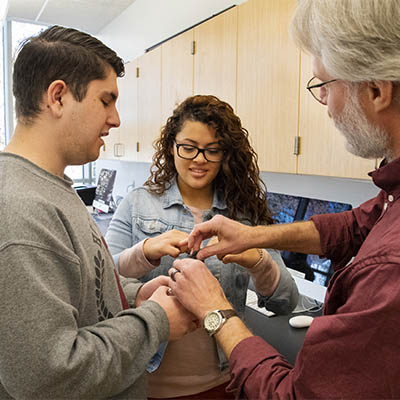
Computational Physics
- This is the right program for you if you know you want to continue with advanced study in physics.
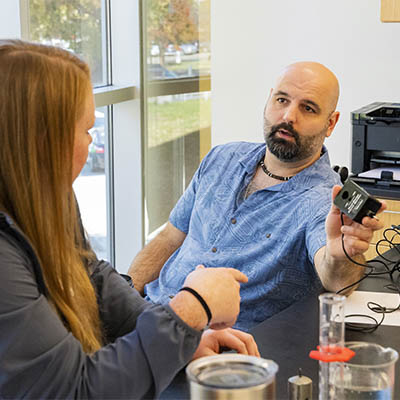
Engineering Transfer Program
- If you know you want to study engineering, our program allows you to take foundational courses in a small-class environment then transfer to a school of your choice.
Set for success
Recent internship sites
Kiewit Construction
Haas Metal Engineering
Bartlett & West
Blue Cross and Blue Shield of Kansas
State laboratories (KDHE, KDOT, KTA)
Student/faculty ratio
14:1
Qualities for success
Curiosity
Integrity
Creativity and patience
Ability to work collaboratively
Program cost
Courses in this program are offered at the Traditional Undergraduate rate. Students are eligible for scholarships and financial aid.
GET IN TOUCH WITH Department of Physics & Astronomy
Physics & Astronomy Department
Stoffer Science Hall, Room 210
1700 SW College Ave.
Topeka, KS 66621
Phone & Email
785.670.2141
physics@washburn.edu
engineering@washburn.edu


